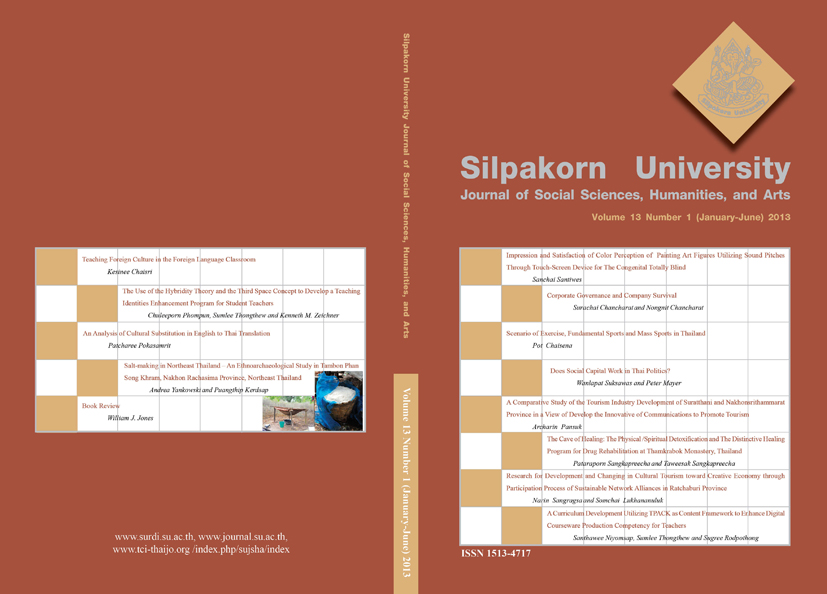A Curriculum Development Utilizing TPACK as Content Framework to Enhance Digital Courseware Production Competency for Teachers
Main Article Content
Abstract
Regarding the lack of digital courseware, especially in the Social Studies subject which could well represent the Thai traditional society, social studies teachers must possess competency to create digital courseware based on local and learner’s needs, situational adaptable, as well as uniquely different from other commercial or imported courseware. Therefore, it is very important to develop a curriculum to enhance digital courseware production competency for social studies teachers by applying the principle of TPACK as its content framework. This paper exhibits the experiment of applying a curriculum utilizing TPACK as the content framework to 11 social studies teachers in Punpin district in Southern Thailand. It is found that knowledge in applying social studies pedagogy to digital courseware production (adapted from PCK), knowledge in using technology to collect resources of social studies content (adapted from TCK) and knowledge in using computer program for digital courseware production (adapted from TPK) should be appropriately adapted based on existed knowledge and experience of teachers. In addition, the learning of the three knowledge areas should be integrated for better digital courseware production competency. It is recommended that knowledge in using technology to collect resources of social studies content and knowledge in using computer program for digital courseware production should be added in the learning management of knowledge in applying social studies pedagogy to digital courseware production in order for the teachers to see the overall picture of digital courseware and to guide and plan for the better self-production of digital courseware. It is also noted that follow-up coaching and encouragement is necessary to keep teachers participating in the curriculum accomplishing their productions.
Downloads
Article Details
All rights reserved. Apart from citations for the purposes of research, private study, or criticism and review,no part of this publication may be reproduced, stored or transmitted in any other form without prior written permission by the publisher.
References
Bureau of Teacher Education Personnel Development, The Office of the Basic Education Commission. (2010) Teacher Competency Evaluation Manual Revised Edition. [Online URL: www.hrd.obec.go.th/news/feb/article_20100204133338.pdf] accessed on December 20, 2011.
Doering, A., Veletsianos, G., Scharber, C., and Miller, C. (2009) Using the technological, pedagogical, and Content knowledge framework to Design online learning environments and professional development. Educational Computing Research, 41(3): 319-346.
Koehler, M. (2011) TPACK-Technological Pedagogical Content Knowledge.[Online URL: www.tpck.org/] accessed on July 30, 2011.
Markauskaite, L. (2007) Exploring the structure of trainee teachers’ ICT literacy: the main components of, and relationships between, general cognitive and technical capabilities.Educational Technology Research and Development, 55(6): 547-572.
Na-songkhla, J. (2003) Research Report on Technological Wave of International Education: Policy Recommendations for Primary Education.
Na-songkhla, J. (2004) Teacher Competency in Electronic Learning Age. Faculty of Education of Chulalongkorn University Journal, 32(3) Mar-Jun: 121-128.
Niess, M. L., van Zee, E. H., and Gillow-Wiles, H. (2010) Knowledge Growth in Teaching Mathematics/Science with Spreadsheets: Moving PCK to TPACK though Online Professional Development. Journal of Digital Learning in Teacher Education, 27(2): 42-51.
Office of Education Council. (2005) Report on Performance Assessment of Computer Technology Use for Education in Primary Educational Institutes. Bangkok : Evaluation Bureau.
Prampituk, K. (2002a) Substances on Development and the Use of Computer for Primary Education: Case Study of Avemariah School in Ubonratchathani Province. Bangkok : Department of Curriculum and Instruction Development.
Prampituk, K. (2002b) Substances on Development and the Use of Computer for Primary Education: Case Study of Ban Thamnieb School in Suratthani Province. Bangkok: Department of Curriculum and Instruction Development.
Prampituk, K. (2002c) Substances on Development and the Use of Computer for Primary Education: Case Study of Rayong Kindergarten School in Rayong Province. Bangkok: Department of Curriculum and Instruction Development.
Prampituk, K. (2002d) Substances on Development and the Use of Computer for Primary Education: Case Study of Assumption Lampang School in Lampang Province. Bangkok : Department of Curriculum and Instruction Development.
Prampituk, K. (2002e) Substances on Development and the Use of Computer for Primary Education: Case Study of Lampang Kindergarten School in Lampang Province. Bangkok : Department of Curriculum and Instruction Development.
Prampituk, K. (2002f) Substances on Development and the Use of Computer for Primary Education: Case Study of Ubonratchathani Kindergarten School in Ubonratchathani Province. Bangkok : Department of Curriculum and Instruction Development.
Prampituk, K. (2002g) Substances on Development and the Use of Computer for Primary Education: Case Study of Teap Nimitr School in Suratthani Province. Bangkok: Department of Curriculum and Instruction Development.
Prampituk, K. (2002h) Substances on Development and the Use of Computer for Primary Education: Case Study of Saint Joseph Rayong School in Rayong Province. Bangkok : Department of Curriculum and Instruction Development.
Smith, M. K. (1996, 2000) Curriculum Theory and Practice’ the Encyclopaedia of Informal Education. [Online URL: www.infed.org/biblio/b-curric.htm] accessed on January 3, 2012.
Thongthew, S. (2010) Teaching Documents for Subject Code 2716854: Curriculum Development Processes. Copied.
UNESCO. (2002) Information and Communication Technology in Education: A Curriculum for Schools and Programme of Teacher Development. France: Division of Higher Education.


